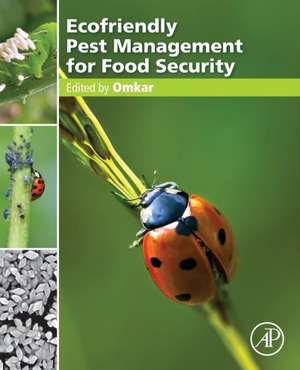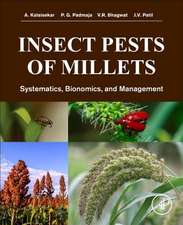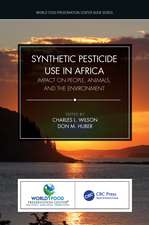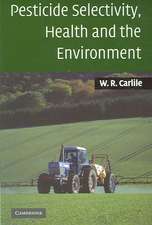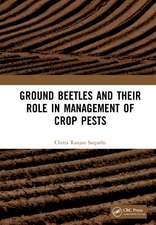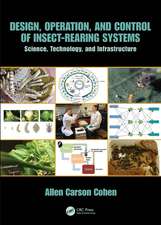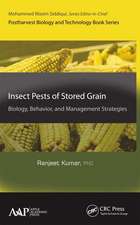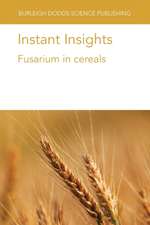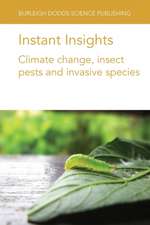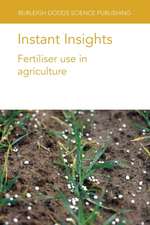Ecofriendly Pest Management for Food Security
Autor Omkaren Limba Engleză Paperback – 18 feb 2016
As the world’s population continues its rapid increase, this book addresses the production of cereals, vegetables, fruits, and other foods and their subsequent demand increase. Traditional means of food crop production face proven limitations and increasing research is turning to alternative means of crop growth and protection.
- Addresses environmentally focused pest control with specific attention to its role in food security and sustainability.
- Includes a range of pest management methods, from natural enemies to biomolecules.
- Written by experts with extensive real-world experience.
Preț: 593.60 lei
Preț vechi: 726.34 lei
-18% Nou
Puncte Express: 890
Preț estimativ în valută:
113.60€ • 123.35$ • 95.42£
113.60€ • 123.35$ • 95.42£
Carte tipărită la comandă
Livrare economică 15-29 aprilie
Preluare comenzi: 021 569.72.76
Specificații
ISBN-13: 9780128032657
ISBN-10: 0128032650
Pagini: 762
Dimensiuni: 191 x 235 x 38 mm
Greutate: 1.54 kg
Editura: ELSEVIER SCIENCE
ISBN-10: 0128032650
Pagini: 762
Dimensiuni: 191 x 235 x 38 mm
Greutate: 1.54 kg
Editura: ELSEVIER SCIENCE
Public țintă
Graduate students of Zoology, Agriculture and other disciplines of Biological Sciences; researchers and policy makers in agriculture, food safety,and sustainabilityCuprins
Chapter 1. Insects and Pests
Chapter 2. Biocontrol of Insect Pests
Chapter 3. Aphids and Their Biocontrol
Chapter 4. Parasitoids
Chapter 5. Trichogrammatids
Chapter 6. Anthocorid Predators
Chapter 7. Reduviid Predators
Chapter 8. Syrphid Flies (The Hovering Agents)
Chapter 9. Ladybird Beetles
Chapter 10. Chrysopids
Chapter 11. Mite Predators
Chapter 12. Entomopathogenic Nematodes
Chapter 13. Insect Viruses
Chapter 14. Bacillus thuringiensis
Chapter 15. Entomopathogenic Fungi
Chapter 16. Plant Monoterpenoids (Prospective Pesticides)
Chapter 17. Antifeedant Phytochemicals in Insect Management (so Close yet so Far)
Chapter 18. Neem Products
Chapter 19. Semiochemicals
Chapter 20. Insect Hormones (as Pesticides)
Chapter 21. Integrated Pest Management
Chapter 22. Biotechnological Approaches
Chapter 23. GMO and Food Security
Chapter 2. Biocontrol of Insect Pests
Chapter 3. Aphids and Their Biocontrol
Chapter 4. Parasitoids
Chapter 5. Trichogrammatids
Chapter 6. Anthocorid Predators
Chapter 7. Reduviid Predators
Chapter 8. Syrphid Flies (The Hovering Agents)
Chapter 9. Ladybird Beetles
Chapter 10. Chrysopids
Chapter 11. Mite Predators
Chapter 12. Entomopathogenic Nematodes
Chapter 13. Insect Viruses
Chapter 14. Bacillus thuringiensis
Chapter 15. Entomopathogenic Fungi
Chapter 16. Plant Monoterpenoids (Prospective Pesticides)
Chapter 17. Antifeedant Phytochemicals in Insect Management (so Close yet so Far)
Chapter 18. Neem Products
Chapter 19. Semiochemicals
Chapter 20. Insect Hormones (as Pesticides)
Chapter 21. Integrated Pest Management
Chapter 22. Biotechnological Approaches
Chapter 23. GMO and Food Security
